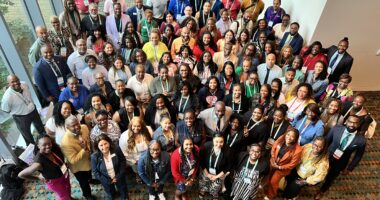Keeping Ahead of New Trends in Education
NAESP is guided by resolutions that focus on leading, learning, and community—and we look to our members for invaluable feedback to ensure the NAESP Platform continues to address emerging and relevant trends in school leadership.

What does NAESP stand for as an organization? What do our members believe? What are they seeing as emerging trends in education? The answer is the NAESP Platform, a set of resolutions that focus on leading, learning, and community. NAESP uses this platform to guide the association in everything we do, from developing resources to advocating on behalf of school leaders on Capitol Hill. And it’s imperative that the platform be developed, overseen, and annually updated by our members to ensure our work on your behalf continues to represent and be responsive to the issues you’re seeing in your schools and communities and in school leadership.
Every year, a Resolutions Committee made up of NAESP members reviews the resolutions in the NAESP Platform to ensure they are relevant in today’s education landscape and to suggest updates, if needed, to better reflect the changes that are happening in our schools. This year, the committee proposed revisions to seven resolutions.
Now the process is open to the NAESP membership for review. This is where we need your help.
What’s Up for Review
This year, the Resolutions Committee proposed changes to the following sections:
- Principal Leadership;
- Well-Rounded and Complete Education;
- Selection and Use of Instructional Materials;
- Principal Performance and Evaluation;
- Principal Health and Wellness;
- U.S. Department of Education; and
- Student Health and Wellness.
While some of the proposed updates are intended to clarify key points on certain topics, others served as new topics to the resolutions that pinpoint emerging trends in education like the use of artificial intelligence (AI) and the effects of social media use on student mental health.
Let’s take a deeper look at the biggest proposed updates.
- Well-Rounded and Complete Education: As children should be the country’s No. 1 priority and the focal point of education, NAESP believes in a well-rounded and complete education for the whole child—and this means professional learning opportunities for all educators that build their capacity to respond to social, emotional, and mental health needs of children. The committee thought that adding “mental health” to this list of needs of students will place more emphasis supporting children during this emerging crisis.
- Student Health and Wellness: As the U.S. Surgeon General has warned, a contributing risk factor in the child mental health crisis is the increased use and exposure to social media platforms for students of all ages, even the youngest learners. The committee updated this section to address growing concerns about the ubiquity of social media and its use and impact on children. The added resolution language says: “NAESP recognizes that social media can be beneficial to some youth, but online activities are not necessarily benign and that a growing body of research suggests it can be harmful to young people and lead to anxiety, depression, low self-esteem, cyberbullying, online harassment, poor sleep, eating disorders, and other mental health issues. Technology and social media companies have a responsibility to protect youths’ privacy and exposure to harmful and inappropriate content. Educators should be mindful of social media’s risks, limit its use, and support parents and students in protecting themselves.”
- Selection and Use of Instructional Materials: While NAESP long has prioritized the practice of teaching the ethical, responsible, and safe use of technology, it has been proposed that we include a specific reference to AI in this resolution and ways to emphasize instructional support for teachers as they learn strategies and best practices to put AI to use in their classrooms.
How to Take Part
Your feedback is critical to the resolutions process. Here’s how it works—and how you can take action to make sure your voice and your school are represented.
- Member Feedback Requested: Review the resolutions, including the proposed changes, and offer comments and suggestions based on your experiences as a school leader. Submit feedback via email to Jennifer Shannon, director of NAESP’s Governance Services, at jshannon@naesp.org by Jan. 15, 2024.
- Member Feedback Reviewed: The Resolutions Committee will review member feedback between Jan. 16, 2024, and Jan. 18, 2024, to determine if further revisions are necessary.
- Open Hearing to Discuss Proposed Changes: The committee will hold an open hearing on Zoom, and all NAESP members are welcome to take part in the discussion of the proposed changes to resolutions. To take part, join the Zoom meeting Jan. 24, 2024, at 4 p.m. ET.
- Open Hearing to Learn About the Committee’s Decisions: NAESP members may join an open hearing on Zoom to learn about the Resolution Committee’s decisions on the proposed changes that were presented during the first open hearing. To participate, join the Zoom meeting Jan. 31, 2024, at 4 p.m. ET.
- Updated NAESP Platform Approved: During the 2024 National School Leaders Advocacy Conference, from March 10-13, 2024, the NAESP Board of Directors will review the proposed resolutions and recommended changes and inform the General Assembly of the resolutions and the board’s actions. Following approval, the updated 2024 NAESP Platform will be posted.
You lead your schools every day with passion and purpose, and we are asking for that same leadership to ensure the association you count on continues to advocate for your needs and support you with the most relevant and timely resources. We need our members, representing all demographics across the country, to review the resolutions and offer insight into whether they accurately reflect what you’re experiencing in your school, with your students, and as a principal or an assistant principal. Your voice as a school leader has never been more important than it is at this moment.
David Griffith is associate executive director of Policy and Advocacy at NAESP.




